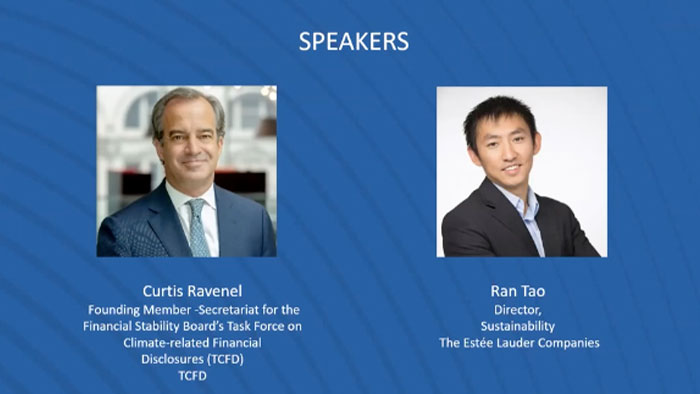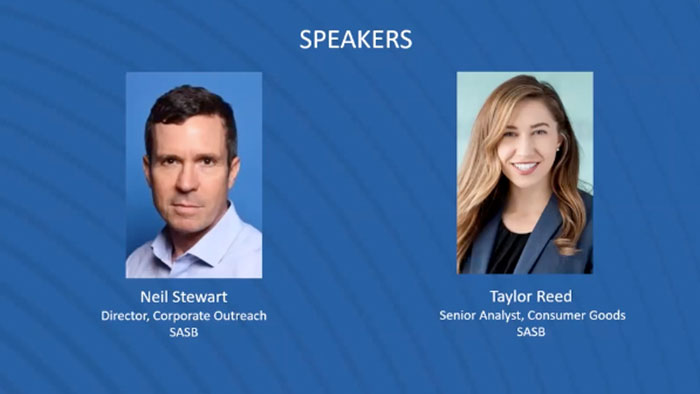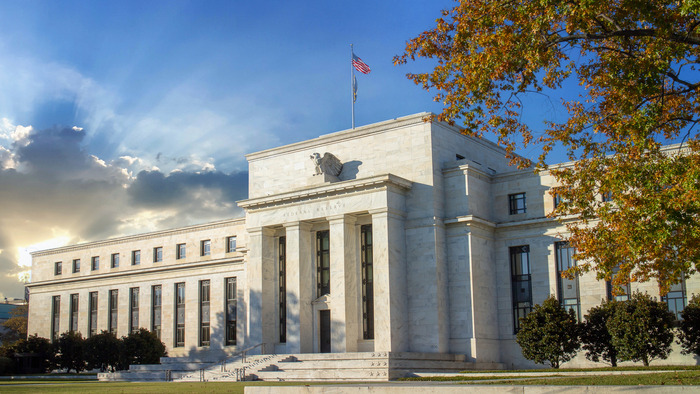The Business Case for CSR
- By [ Erin Hiatt , Katie Nicholos ]
In today’s consumer-driven economy, corporate social responsibility (CSR) is no longer an option; it is a necessity. Increasingly, investors and consumers want to do business with companies leading on environmental and social impact that extend from supply chains into stores. Social and environmental benefits aside, these investments help reduce risk exposure and build loyalty with customers and employees alike.
That's why we have worked to develop a toolbox of resources to help retail finance teams understand the opportunities presented by CSR. Explore the issue and resources below to learn more about how your company can benefit from the business case for CSR.
Retail & Brand: The Environment Matters
Across industries, environmental projects are proving their value to the bottom line. Reducing environmental impacts often mean reducing costs and risk by increasing efficiency and brand value. The World Economic Forum (WEF) and Accenture found that a series of sustainable supply chain practices result in a 9 to 16 percent cost reduction and a revenue increase of 5 to 20 percent.
- Nike's CFO directly credits sustainability with driving much of the company's innovation work, where they expect to see 50% of the company's revenue growth.
- As of 2015, Microsoft has saved more than $10 million a year with an internal carbon fee. In this model, Microsoft's business groups pay an incremental fee for activities that increase carbon emissions, incenting employees to reduce their carbon footprint and costs. In July 2020, Microsoft announced they were expanding their carbon fee to include scope 3 emissions in addition to all scope 1 and 2.
- Unilever found that its sustainable-living brands have grown 46 percent faster than the rest of the business and delivered 70 percent of its turnover growth. Now in it’s 10th year, Unilever affirmed that they have avoided over $1.4 billion in costs.
- HP attributes $700 million in new revenue from 2017 to contracts or sales in which sustainability factors were a known consideration -- a 38 percent year-over-year increase in sales bids with sustainability requirements.
- Lessons from REI on financing an energy agenda: RILA sat down with retail energy veteran, Mark Lester, divisional vice president of retail operations with REI, to discuss energy management as a recent finance executive.
- Within 2016 Apple issued $1.5 billion in green bonds in February, followed by a second worth $1 billion in June.
- “This will allow investors to show they will put their money where their hearts and concerns are,” Lisa Jackson, Apple’s vice president of environment, policy and social initiatives
- Starbucks, discovered green bonds to be beneficial to expedite sustainability investments, offered green bonds totaling $1.2 billion between May 2016 and March 2017.
- $7.1 million internal carbon fund creates a virtuous cycle for LVMH.
- VF in February 2021 announced that their inaugural green bond’s net proceeds totaled approximately $598 million dollars.
The NYU Stern Center for Sustainable Business (CSB) developed the Return on Sustainability Investment (ROSI) methodology to bridge the gap between sustainability strategies and financial performance, helping to build a better business case for the value of sustainability initiatives.
- REI- Employee Wellbeing
- Eileen Fisher - Carbon Efficient Transport and Circularity
- Best Buy – Exploratory Analysis Uncovers Energy Savings Opportunities
- Kohl's - Energy Finance Strategy
- The Home Depot - Financing a Renewable & Alternative Energy Commitment
- Food Lion - Comprehensive Energy Project Planning Enables Significant Efficiencies
- Best Buy - Update Internal Purchasing Systems to Facilitate a Portfolio-wide Energy Upgrade with Maintenance Funds
- adidas Group - Venture Capital Energy Fund
- Whole Foods - Making the Case for Rapid Solar Roll-outs
Financing Our Future Podcast
This podcast, from A4S, looks at how to make sustainable business, business as usual.
View Podcast
New Markets
New consumer trends around re-commerce brings corporate social impact and sustainability into new spaces for retailers to engage. Threadup’s 2020 report announced that “2.5x more consumers plan to shop at more sustainable brands, with an expectation that the secondhand market will double market share in 10 years.”
- Patagonia reselling used items: “ This wasn’t just an act of urgency to keep clothing out of landfills. A 3-in-1 Snowshot Jacket that retails new for about $400 was recently listed on Patagonia’s Wornwear website for $187 to $207, more than twice the amount paid to customers in a voucher. “It’s a profitable business unit,” said Phil Graves, director of corporate development at Patagonia. What it pays: Each resale of a high-quality used jacket can net $100.
- Levi’s in partnership with Trove, launched their own secondhand market: in their infographics around the lauch they state, “global consumers miss out on $460 billion of value a year by throwing away clothes that they could continue to wear.”
"The doubters got on board quickly when they saw that our P&L could beneift while we were doing good work for the environment"
Doug McMillon
- CEO
- Walmart
Investor Expectations
- Blackrock Letter to CEOs:
- “From January through November 2020, investors in mutual funds and ETFs invested $288 billion globally in sustainable assets, a 96% increase over the whole of 2019.1 I believe that this is the beginning of a long but rapidly accelerating transition – one that will unfold over many years and reshape asset prices of every type. We know that climate risk is investment risk. But we also believe the climate transition presents a historic investment opportunity.”
- “Over the course of 2020, we have seen how purposeful companies, with better environmental, social, and governance (ESG) profiles, have outperformed their peers. During 2020, 81% of a globally-representative selection of sustainable indexes outperformed their parent benchmarks.”
- “But the story goes deeper. It’s not just that broad-market ESG indexes are outperforming counterparts. It’s that within industries – from automobiles to banks to oil and gas companies – we are seeing another divergence: companies with better ESG profiles are performing better than their peers, enjoying a ‘sustainability premium.’”
- NASDAQ Diversity Requirement: Nasdaq (Nasdaq: NDAQ) [on December 1st, 2020] filed a proposal with the U.S. Securities and Exchange Commission (SEC) to adopt new listing rules related to board diversity and disclosure. If approved by the SEC, the new listing rules would require all companies listed on Nasdaq’s U.S. exchange to publicly disclose consistent, transparent diversity statistics regarding their board of directors. Additionally, the rules would require most Nasdaq-listed companies to have, or explain why they do not have, at least two diverse directors, including one who self-identifies as female and one who self-identifies as either an underrepresented minority1 or LGBTQ+. Foreign companies and smaller reporting companies would have additional flexibility in satisfying this requirement with two female directors.
- Vanguard: ESG Investing
- “Vanguard has been managing ESG investment products for over 20 years, starting with our FTSE Social Index Fund, which launched in 2000. It's now the largest ESG-screened index fund in the United States.* For more than 45 years, we've taken a stand for all investors while advocating for improved corporate governance in the market. As a signatory to the United Nations-supported Principles for Responsible Investment, we encourage companies to conduct business in a socially conscious way.”
- “Investment managers and investors now have more information on how ESG factors affect companies, allowing them to make better decisions. More than 11,000 companies worldwide report on how they incorporate ESG principles into their business strategies, resources, and operations. In addition, 125 organizations produce research on the ESG investment landscape.”
- “ESG investing has gone mainstream thanks to better information and an increased interest from investors seeking to make an impact through their investment decisions. It's driven by individuals who embrace the idea that their investment objectives and personal values aren't mutually exclusive. For investors in the United States, there are more than 600 ESG funds and ETFs (exchange-traded funds) available, representing $161 billion in assets under management. [according to Morningstar Direct. Data as of July 31, 2020]
- State Street: State Street’s ESG Scoring
- “In 2019 State Street Global Advisors launched its ESG scoring system called the R-factor (R as in responsible investing). The scores are based on SASB’s financial maturity framework and dray from the raw data provided by several high-quality ESG data sources as well as governance insights from State Street’s asset stewardship team. Global Advisors will be including the ESG scores in their standard reporting to clients in order to give them a better view to the ESG profile of their portfolio holdings.”
- In August of 2020 State Street integrated diversity metrics into their R-factor scoring system.
- From their 2020 Stewardship Report: “Beginning in the 2020 proxy season, we started taking action against board members at companies in the S&P 500, FTSE 350, ASX 100, TOPIX 100, DAX 30 and CAC 40 indices that are laggards based on their R-Factor scores and that cannot articulate how they plan to improve their score. In the event that we feel a company is not committed to engaging with us or improving their disclosure or performance related to financially material ESG matters, we may not support the re-election of the board’s independent leader. Ultimately, we took voting action against 14 companies in 2020.”
Social Impact and Consumer Habits
The following studies suggest show that brands with purpose (brands that offer functional benefits, personal well-being, and collective well-being) may perform better on marketing key performance indicators such as impression, brand familiarity, premium pricing, and purchase and repurchase intent than brands that are not purpose-led. The social impact of companies impacts the bottom line.
- A McKinsey report found that in 2019, “fourth-quartile companies for executive-team ethnic and gender diversity were 27% more likely than companies in the other three quartiles to underperform on profitability. This is up from 25% in 2014. The advantage exists on the other side of the spectrum as well, those in the top quartile of companies for ethnic and gender diversity were 12% more likely to perform on profitability.”
- “Recent studies performed by McKinsey also make a strong business case for ethnic and racial diversity as part of corporate human capital strategy. The results of the study indicate that companies in the top quartile for ethnic and cultural diversity on executive teams were 35% more likely to outperform on EBIT margin in 2014, 33% in 2017, and 36% in 2019”.
- A study by Citi estimates that “by not addressing the racial gaps between black and white Americans, the U.S. economy has experienced up to $16 trillion in economic costs over the past 20 years.”
- McKinsey’s longitudinal study, conducted since 2014, found that companies in the top quartile for gender diversity in their executive teams were 15% more likely to experience above-peer average profitability than companies in the fourth quartile. Three years later, the percentage had increased to 21%. In the most recent study in 2019, this percentage had increased again to 25%
- “The probability of financial outperformance by companies with gender-diverse executive teams is highest at 47% in advanced economies that have high gender parity, such as the United States, the United Kingdom, Finland, and Sweden.”
- A Gall-up study found that customer loyalty and engagement was 10% higher among companies in the top quartile with 23% higher profitability than those in the bottom quartile on employee engagement.
- Deloitte Business Value of Improving your CSR Scorecard: “Deloitte Consulting LLP’s 2019 Global Human Capital Trends survey found that, for the first time ever, CEOs named societal impact as the top success factor for annual performance.” Other notable takeaways include:
- “Nielsen has found that two out of three consumers are willing to pay more for sustainable brands, and recent retail research shows that, after quality, the second-highest reason for customer brand loyalty is sustainable/ethical business practices.”
- “A survey conducted by Fast Company found that nearly 40 percent of millennials say they selected their job because their employer’s social impact was better than that of alternative companies.”
- “In 2018, Bank of America Merrill Lynch determined that companies with better social impact records had greater three-year returns and were more likely to become “high-quality” stocks. Their stocks were also less likely to have substantial price drops, and the companies were less likely to experience bankruptcy.”
- “NYU Stern’s Center for Sustainable Business saw that 50% of CPG growth from 2013 to 2018 came from sustainability-marketed products.”
- “Products that had a sustainability claim on-pack accounted for 16.6% of the market in 2018, up from 14.3% in 2013, and delivered nearly $114 billion in sales, up 29% from 2013. Most important, products marketed as sustainable grew 5.6 times faster than those that were not. In more than 90% of the CPG categories, sustainability-marketed products grew faster than their conventional counterparts.”
- Harvard Business Review: amplified the findings of NYU Stern’s Center for Sustainable Business that in “more than 90% of consumer-packaged goods categories, sustainability-marketed products grew faster than their conventional counterparts.”
Tags
-
Ensuring a Safe, Sustainable Future
-
Retail Works for All of Us








